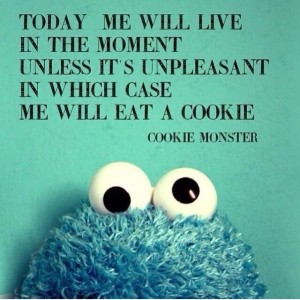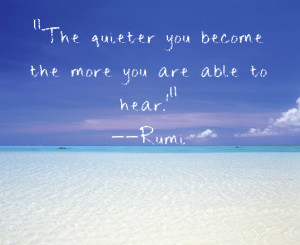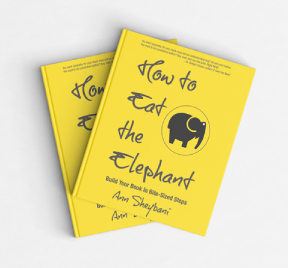Writing
In Which I Quote Rumi And The Cookie Monster
November 24, 2014
I ran into a surgical nurse at a party last week in Ireland. We were chatting about life, as one is prone to do at gatherings. And when I told this nurse about a talk I was giving when I got back to the States, about what I’d really noticed during our time in Ireland, about getting lost in the busyness, losing connection to myself, the need to slow down and breathe, to think, to have enough space to know how I feel and what I really need to attend to, she told me about a practice they’d put into place in the operating room where she worked.
Between each procedure, no matter how busy the day, no matter how many emergencies are lined up outside the door, the doctors, nurses, and technicians are required to stop dead in their tracks, drop their arms by their sides, and stand for a full two minutes doing absolutely nothing. They are not allowed to rush into the next thing. And what they discovered is that, invariably, someone had the realization that he/she had forgotten an important step in the procedure they’d just finished. He/she had failed to swab something, or remove a sponge, or whatever. It seemed to happen every time. And they all would have missed something really vital had they not had the time to stop and breathe. To regroup between tasks.
It saved the hospital millions of Euros in lawsuits each year.
Sometimes. All we need is two minutes to think. To sit and breathe. To connect. To slow down. To pay attention.
When I work with coaching clients, we invariably have to focus on creating emotional wellness practices that will allow for this space because you can’t know what you need and want until you check in. A few minutes to think and process. A few minutes to feel.
So many of us are afraid to feel what’s in there. We don’t want to get lost in all of that mess. We don’t have time to deal with all of the crap we worked so hard to stuff down in the first place.
We’ve got to keep pushing forward; accomplishing, so we can earn approval.
Here’s something I learned the hard way: give a driven person a list of suggestions designed to feed her emotional wellness, and watch her create another ENORMOUS cross to bear. Watch her get all breathless and anxious because, once again, she just can’t do it all.
Sorry, but I’m onto that trick.
Emotional wellness is all about taking your time; about being thoughtful. It means considering the consequences of your decisions and your actions. Not adding to your to-do list and getting ‘er done.
It means reflecting.
It means slowing down… and paying attention… to those very few things that matter most.
It means connecting to what you think and feel at any given moment.
You have to get quiet. Really quiet. For two fucking minutes.
It’s in this space of stillness that truth surfaces, understanding expands, and we discover the answers. Our answers.
Silence is a refuge that restores and rejuvenates. Silence helps us sort priorities, tutors us in the skill of deep listening, and gives us a place from which to live. Silence is the path back to the authentic self.
Get quiet and you will find you. It doesn’t have to be complicated.
Consider some of these tools I’m going to mention as a menu from which to choose. Try one out for a week. See how it makes you feel. Try a different one. Pick what you like best.
How can you create quiet and space? Think about it. What would work for you?
- Meditate for 10 minutes a day. Oprah and Deepak have wonderful 21-day challenges that are absolutely free. I love these.
- Shut off electronics for half a day
- Pray
- Sit on the couch and stare out a window. Without feeling guilty.
- Be alone
- Turn off the engine and sit in your car before you go in
- Go on a silent retreat
- When your upset, or angry, or sad, open a notebook and explain why. What is making you upset? Why are you angry? What is making you sad?
- Wake up 15 minutes earlier and read a book with a cup of coffee.
- Take out your calendar. Schedule a day off, or even half a day to goof off.
- Start your day by asking a better question. Instead of beating yourself up for what you did wrong the day before, ask yourself this: How can I appreciate even more God’s grace and acceptance in my life? Then wait for the answer.
- Or write a short list of what you did right the day before. What did you do right? Now, there’s a different twist.
- Go for a walk.
- Julia Cameron, author of The Artist’s Way, suggests clearing the psychic junk from your head each day by writing three pages of thoughts. Incomplete sentences, random notions, gripes, and observations. Morning pages—in particular—-help me sort out the feelings I tend to suppress
- Do what the E.R. nurses do. Stop for a full 2 minutes between tasks.
This busy scurrying thing we do—thinking it’s the fuel that feeds our accomplishment—only serves to make us scattered, ungrounded, distracted, unavailable. To ourselves and others.





